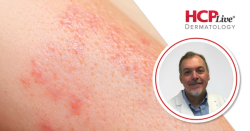
OR WAIT null SECS
Psoriatic Treatment Does Not Increase Risk of COVID-19 Infection
Furthermore, psoriatic treatment did not appear to significantly reduce COVID-19 vaccine efficacy.
New data into psoriasis and COVID-19 found that systemic treatments for the skin disease did not appear to meaningfully increase the risk of infection.
The new findings, which suggested that some treatments such as TNFi therapy could be used to protect from severe disease, were presented at American Academy of Dermatology (AAD) 2022 Annual Meeting in Boston.
The implications of psoriasis treatment on the risk of COVID-19 had been largely unexplored in the beginning of the pandemic, as was the impact of psoriasis treatment on vaccination from the virus.
With their study, Joel Gelfand MD, MSCE, James J Leydon Endowed Professor of Dermatology and Epidemiology at the Perelman School of Medicine, University of Pennsylvania, and fellow investigators incorporated the latest COVID-19 data into clinical decision making for patients with psoriatic disease.
Gelfand and colleagues operated through the National Psoriasis Foundation’s (NPF) COVID-19 Task Force that was established May 15, 2020.
The task force was assembled to identify issues in care for patients with psoriasis and psoriatic arthritis as they related to the pandemic as well as serve as an expert resource in an advisory capacity.
The task force consisted of 18 voting members from the dermatology, rheumatology, pediatrics, infectious diseases, critical care, epidemiology, and immunology fields, as well as 4 fellows and senior NPF staff. They would go on to issue 32 recommendation for the management of psoriatic disease during the pandemic.
In the United States alone, an evaluation into US claims data identified a total of 2306 patients with rheumatoid arthritis, 421 with psoriatic arthritis, and 811 patients with ulcerative colitis with COVID-19.
No evidence of increased risk of hospitalization or severe COVID-19 was observed in patients with psoriatic arthritis on systemic treatment. However, TNFi was associated with a 36% decreased risk of hospitalization from the virus compared to the general population.
Gelfand and colleagues noted that the data regarding patients with psoriatic disease was reassuring yet limited, and suggested larger scale, longer-term, population-based studies were required to ascertain clinically relevant COVID-19 outcomes.
Regardless, of the 190 millioin Americans who received at least 1 dose of the COVID-19 vaccine, 60 reports from the Vaccine Adverse Event Reporting System (VAERS) reported psoriasis aggravation.
Though limited data exists, TNFi, IL-17, and IL-12/23 therapies did not affect antibody response after vaccination. However, patients treated with B-cell inhibitors such as ritixumab, mycophenolate, and glucocorticoids were less likely to respond to the COVID-19 vaccine.
Additionally, 62% of patients with immune mediated inflammatory diseases such as psoriasis who were treated with methotrexate had “adequate” responses to the vaccine.
Regarding outpatient management of COVID-19, investigators suggested nirmatrelvir 300 mg plus ritonavir 100 mg orally twice daily for 5 days among other oral therapies including sotrovimab and remdesivir.
Overall, Gelfand and colleagues determined that systemic treatments for psoriasis did not appear to increase the risk of COVID-19 illness, and suggested that all eligible patients with psoriasis be vaccinated and boosted with an mRNA vaccine, as disease flares were both rare and manageable.
Furthermore, the team identified no reasons to alter the scheduling of biologics in patients with psoriatic disease following vaccination.
To hear more from Dr. Gelfand on his other AAD session on cardiometabolic disease in psoriasis patients, click the link.
Related Content:


